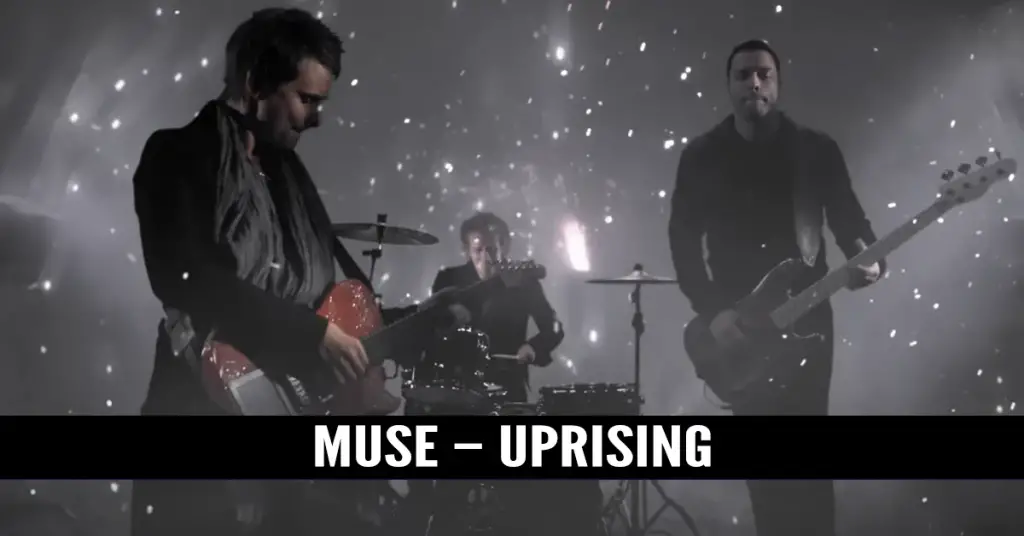In an era of global unrest, media manipulation, and rising distrust in authority, Muse delivered a thunderous call to arms with “Uprising”—a song that didn’t just speak to the times, but sounded like the times. Released in 2009 as the lead single from their fifth studio album The Resistance, “Uprising” wasn’t just a hit—it was a wake-up call.
Armed with gritty synths, stomping beats, and a message of defiance, the track cemented Muse’s reputation as rock’s sci-fi rebels—channeling Orwell, Queen, and Rage Against the Machine into a uniquely modern rebellion anthem.
The Song as a Rallying Cry
Frontman Matt Bellamy has never shied away from grand themes—surveillance states, dystopian futures, societal collapse—but with “Uprising,” he hit a nerve that resonated across borders and generations.
“They will not force us / They will stop degrading us / They will not control us / We will be victorious…”
These aren’t just lyrics—they’re protest slogans. And they arrived at the perfect moment. In the wake of the 2008 financial crisis, growing political polarization, and an increasingly digitized and surveilled world, “Uprising” captured the mood of mistrust and resistance.
A Genre-Bending Sonic Rebellion
Musically, “Uprising” is classic Muse: an exhilarating blend of glam rock, industrial edge, and space-age drama. The song opens with a distorted synth-bass groove that sounds like a cybernetic heartbeat, before exploding into a full-on stomp—somewhere between a protest march and a dance-floor revolt.
Bellamy’s vocals are equal parts sneer and sermon, delivering each line with urgency. Meanwhile, Dominic Howard’s tribal drums and Chris Wolstenholme’s thunderous bass drive the song forward with unstoppable momentum.
Influences abound—critics noted similarities to Doctor Who’s theme, as well as hints of Gary Glitter, Depeche Mode, and even Pink Floyd—but Muse filtered those through their own futuristic lens to create something entirely their own.
Chart-Topping Defiance
“Uprising” was a commercial triumph, hitting #1 on Billboard’s Alternative Songs chart and staying there for an incredible 17 weeks—one of the longest reigns in the chart’s history. It also cracked the Top 40 in multiple countries and became Muse’s most recognized song in the U.S.

The track’s mass appeal didn’t water down its message. If anything, the fact that a song so openly critical of “fat cats” and “paranoia” could become a mainstream hit proved Muse’s power—and perhaps how deeply their message struck a chord.
The Visual Message
The music video for “Uprising” is equally rich in symbolism. It features a nightmarish toy-town dystopia being overrun by monstrous teddy bears—an allegory of how consumer culture and manufactured innocence can quickly turn sinister.
Through it all, Muse perform defiantly amid the chaos, embodying the very spirit of resistance the song preaches.
It’s tongue-in-cheek, darkly comic, and deeply unsettling—just like the world the song describes.
A Soundtrack for Modern Revolution
Over time, “Uprising” has become a protest anthem, used in political rallies, social movements, and documentaries. Whether you’re fighting government overreach, corporate corruption, or media propaganda, it’s a soundtrack that channels frustration into fuel.
And in typical Muse fashion, it walks the line between paranoia and prophecy. The lyrics don’t just diagnose a problem—they demand action.
“They will not control us…”
It’s not just a warning.
It’s a mission statement.
Final Thoughts
“Uprising” is Muse at their best—urgent, theatrical, and unafraid. It’s a rare song that gets your blood pumping and your mind turning. A true anthem for the 21st century, it reminds us that rebellion doesn’t have to be violent—it can be rhythmic, relentless, and yes, even fun.
In a world built on distractions and divisions, Muse didn’t just offer a voice of resistance.
They gave it a pulse.


Facebook Comments